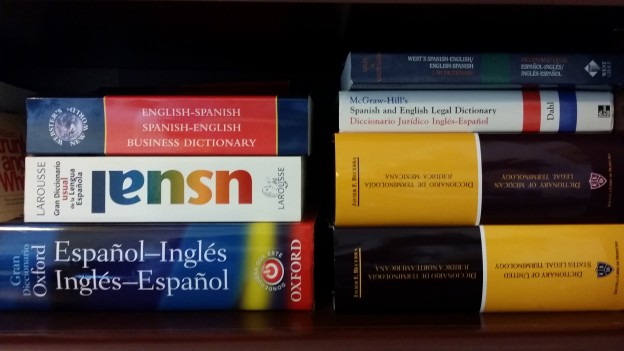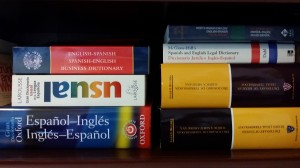I read the news about Waverly Labs’ new in-ear realtime translation device (video below) with great interest. With rapid advances in artificial intelligence (AI), interpreters are sometimes asked if technology will soon replace us. The short answer is that technology definitely assists good interpreters and translators, and may eliminate the need for expenditure of human brain effort on certain large-volume, low-priority projects. But, while I do embrace new technology to assist me in my translation and interpreting work, I’m not the least bit concerned that it will send me to the unemployment line.
Continue reading
Tag Archives: translation
Preciso’s Holly Behl Joins TAJIT Board of Directors
It is my privilege and honor to announce that I am now serving translators and interpreters at the state level, after being nominated to the Texas Association of Judiciary Interpreters and Translators. As a longtime TAJIT member, I have long believed that TAJIT is the organization best positioned to unite court interpreters and legal translators from across Texas and promote both our profession and meaningful access to justice for Limited English Proficient court users. The Board will meet soon to review TAJIT’s programs and strategy, under the leadership of Interim Chair Marco Hanson.
If you hire court interpreters or legal translators, I encourage you to look first to TAJIT members.
If you are a court interpreter or legal translator and you haven’t yet joined TAJIT (or if your membership has lapsed), I take this opportunity to humbly encourage you to join, in support of the advancement of our profession in Texas.
More information at TAJIT’s website.
—
Content Copyright © 2015, Preciso Language Services
PERMISSION TO REPRINT: You may use any items from this article in your print, blog, magazine or electronic newsletter. But in order to do so, you must include the following paragraph, including a link to www.PrecisoLanguage.com.
“Information courtesy of Preciso Language Services and www.PrecisoLanguage.com, a translation and interpreting firm owned by Certified Translator and Master Licensed Court Interpreter Holly Behl.”
DIY Interpreting – Money saver or false economy?
This month’s Texas Bar Journal features DIY Depositions, an article exploring the pros and cons of recording depositions without a certified court reporter. The relevant statutes allow this practice under certain exceptions, but the author’s conclusion is that the inconveniences, risks, and resources required are usually not worth the meager savings of eliminating the services of a professional, certified court reporter.
The question of avoiding interpreter fees is also relevant for many law practices. Some bilingual attorneys interpret for their clients’ testimony when possible, and even more use bilingual assistants to interpret during pre-appearance preparations. One attorney recently posted on Facebook in praise of a bilingual Justice of the Peace judge who allowed pro se litigants to proceed in Spanish, saving the parties hundreds of dollars in interpreter fees.
It’s true that there are ways to save on interpreter fees–but do they provide a true savings or a false economy?
What is a “quality” translation?
It’s safe to say that all translation companies promise quality translations. Most clients understand that at the most basic level, a translation must be accurate—it has to say the same thing as the original.
But is an accurate translation necessarily a high quality one? And higher quality often comes at a price–when is it worth it to pay more?

Evolution of a Dictionary Project: Interview with Legal Dictionary Author Javier F. Becerra
Each year, Mexico City’s Escuela Libre de Derecho announces a law-school elective course inconspicuously titled “Legal English Workshop.” Now approaching its twenty-fifth year, the course is still taught by attorney, professor, and author Javier F. Becerra. The professor has written two legal dictionaries, the Dictionary of United States Legal Terminology (with Spanish explanations) and the Dictionary of Mexican Legal Terminology (with English explanations), each more than 1,000 pages, that are prized assets in many legal translators’ collections.
The Walking Dictionary
To understand Becerra’s dictionaries, however, we must leave the professor at his lectern for a moment and find him as a young Mexican lawyer, Continue reading
Language Reads: Dreaming in Hindi
Language Reads is a series designed to give a brief book review from a language professional’s perspective. Fellow translators, interpreters, and language lovers are welcome to submit guest reviews.
- Title: Dreaming in Hindi: Coming Awake in Another Language
- Author: Katherine Rich
- Pages: 384
- ISBN: 9780547336930
Dreaming in Hindi traces the author’s personal journey as she learned Hindi while living in India. This book delighted me because it brought back so many memories of my own experiences as I acquired Spanish as a foreigner in Mexico, including the tumultuous dismantling of my own first-language identity. Learning a language in a foreign country is a task that is all-consuming, exhausting, and fraught with cultural pitfalls. Rich lets us live through this experience with her. She also presents a healthy dose of fascinating linguistics research, in brief summaries and anecdotes that should be quite accessible even to those without a linguistics background.
Overall, I really enjoyed this book and recommend it for anyone who is interested in language acquisition or intercultural interactions.
Worst Corporate Buzzwords
This week one question on LinkedIn garnered more than 400 responses:
What are the corporate buzzwords we’d like to banish?
Buzzwords are fascinating because when they’re fresh, people often use them to signal membership in a social group. But, much like fashion trends, when they become ubiquitous the group considers the word pedestrian and moves on. Never one to overlook the opportunity to do some sociolinguistic analysis, I did a little back-of-the-envelope calculation to find the top ten offenders:
- at the end of the day
- leverage (as a verb)
- socialize (a project or idea to someone)
- low-hanging fruit
- clear/clearly
- going forward
- ask (as a noun -”My ask is this…”)
- blue sky (as a verb)
- strategic/strategize
- value-added
Clearly, being out of the corporate world since forever has kept me out of the loop, because I have never heard several of these. I have no idea what it means to blue-sky something to someone, for example, but it came up a lot. And, although it wasn’t in the top ten, productionize struck me as particularly useless. It turns out, though, that it does have a nuance that produce lacks; productionize means to roll out a new product or service after a pilot period.
Any buzzwords you’d like to go ahead and banish?



